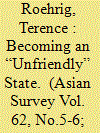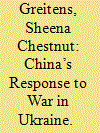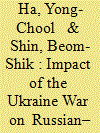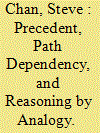|
|
|
Sort Order |
|
|
|
Items / Page
|
|
|
|
|
|
|
| Srl | Item |
| 1 |
ID:
187981


|
|
|
|
|
| Summary/Abstract |
When Russia invaded Ukraine, South Korea’s initial response was cautious. While criticizing Moscow’s actions, the Moon administration also indicated it would join any multilateral sanctions effort but would not impose its own unilateral sanctions as the United States, the European Union, and other Western democracies had done. After receiving internal and external criticism along with the likelihood of economic repercussions for not imposing its own sanctions, South Korea changed course and altered its hedging strategy toward a more robust response to Russian aggression. The war forced South Korea to reassess its relationship with Russia, and despite landing on Moscow’s list of “unfriendly” states, determined that its long-term interests were better served by altering its ties with Russia in favor of greater alignment with other liberal democracies.
|
|
|
|
|
|
|
|
|
|
|
|
|
|
|
|
| 2 |
ID:
187977


|
|
|
|
|
| Summary/Abstract |
Russia’s decision to invade Ukraine in February 2022 posed challenges for the People’s Republic of China and its priorities. This article assesses the Chinese party-state’s response across four dimensions: informational, diplomatic, economic, and military-strategic. Beijing has been most supportive of Moscow in the informational and diplomatic arenas; its economic posture has been mostly self-interested, and military support for Russia has remained more or less constant. China’s stance on the conflict in Ukraine appears to be shaped by several factors: a perceived need to counter the United States; the desire to support Russia while minimizing the costs of doing so to Chinese interests; China’s desire for internal political stability and particular features of its domestic political system that affect foreign policy decision-making; and Beijing’s evolving assessments of what the Ukraine conflict might foretell for Taiwan. The article summarizes China’s interests at the time the conflict began, outlines the party-state’s response, and assesses potential explanations for that response, with specific attention to implications for Taiwan.
|
|
|
|
|
|
|
|
|
|
|
|
|
|
|
|
| 3 |
ID:
187978


|
|
|
|
|
| Summary/Abstract |
Russia’s invasion of Ukraine will have indirect consequences for relations between India and China. In the near term, those consequences appear to be mixed and limited. Over the long term, however, Moscow’s strategic misadventure threatens Russia’s position as an independent power, a defense supplier to India, and a champion of non-Western diplomatic initiatives that tend to encourage more stable China–India relations. The war will also produce “systemic” effects, including altered global expectations about the prospects for major-power conflict and a resurgence of US-led treaty alliances. In combination, these war-driven outcomes are likely to accelerate the deterioration of China–India relations that was already underway before February 2022.
|
|
|
|
|
|
|
|
|
|
|
|
|
|
|
|
| 4 |
ID:
187982


|
|
|
|
|
| Summary/Abstract |
This article examines the impact of the Ukraine war on Russian–North Korean relations at three different levels. At the international level, the war will bring two power groups into confrontation. The closer security cooperation between Russia and China will form an illiberal group that will set the security environment for North Korea to establish a new international identity. At the regional level, Russian–Chinese security alignment will be reinforced, which North Korea will exploit. At the bilateral level, Russian–North Korean relations will be strengthened as Russia’s influence in Northeast Asia wanes.
|
|
|
|
|
|
|
|
|
|
|
|
|
|
|
|
| 5 |
ID:
187979


|
|
|
|
|
| Summary/Abstract |
India and Russia have enjoyed a strong relationship since the collapse of the Soviet Union, partially as a legacy of the Indo–Soviet partnership during the Cold War. But how will this invasion impact future relations between New Delhi and Moscow? We argue that the war will likely harm this relationship over the long term, although some scenarios might minimize this harm. Western sanctions and Russian material losses in the war will make it difficult for Russia to fulfill Indian arms orders, especially if the sanctions regime remains in place for several years, forcing India to turn to other sources of weapons, including the United States. Its increasing isolation from Europe could also force Russia to move even closer to India’s rival China, making India less secure. There may be opportunities to improve energy ties between India and Russia, but Western sanctions and geographic barriers will limit any energy gains.
|
|
|
|
|
|
|
|
|
|
|
|
|
|
|
|
| 6 |
ID:
187984


|
|
|
|
|
| Summary/Abstract |
This essay addresses the strategic implications of the Russo–Ukrainian War as it pertains to relations between China and the US, especially with respect to how this conflict may inform prospective developments across the Taiwan Strait. I pursue this question under three topics: the influence of precedents, path dependency, and reasoning by analogy. The war in Ukraine has interrupted Washington’s intention to pivot to Asia to focus on containment of a rising China, and it has also caused Moscow and Beijing to align more closely. Finally, it may have made the direct military intervention of the US in a possible future crisis involving Taiwan less likely.
|
|
|
|
|
|
|
|
|
|
|
|
|
|
|
|
| 7 |
ID:
187983


|
|
|
|
|
| Summary/Abstract |
Russia’s invasion of Ukraine has had repercussions in regions beyond Europe. One of these regions is Asia, including Northeast Asia. This region is home to China and North Korea, two authoritarian countries often lumped together with Russia as potential threats to the liberal international order. The relationship between China and North Korea has thus been affected by Russia’s aggression toward Ukraine. Beijing and Pyongyang share a decades-old alliance. Despite its ups and downs, the alliance survives as of 2022. Russia’s actions in Ukraine have only reinforced it, bringing China and North Korea closer to each other. Both of them have sided with Moscow, and for similar reasons, including their opposition to what they see as the US’s and NATO’s aggressive stance. And both have taken the same actions to support Russia, further strengthening their connection.
|
|
|
|
|
|
|
|
|
|
|
|
|
|
|
|
| 8 |
ID:
187980


|
|
|
|
|
| Summary/Abstract |
Russia–Pakistan relations have improved since the end of the Cold War. While that trend is likely to continue, Russia is unlikely to transform Pakistan’s difficult strategic circumstances. Russia is insufficiently wealthy to provide enough aid and investment to revitalize Pakistan’s economy. Russia is also too concerned with maintaining access to the Indian defense market to increase defense sales to Pakistan more than modestly. This article reviews what I call the constraints of geoeconomics, where the relatively small size of the Russian and Pakistani economies combines with the considerable distance between them to limit Russian–Pakistani ties despite periodic official interest in deepening them. It situates these current obstacles in the context of the historic Soviet–Pakistani relationship, which was similarly constrained by distance, great power politics, and Indian concerns.
|
|
|
|
|
|
|
|
|
|
|
|
|
|
|
|
|
|
|
|
|